I take medical cannabis everyday – but I was worried people would think I was a lazy stone
November 15, 2025
He takes medical cannabis everyday – but worries people think he’s a lazy stoner
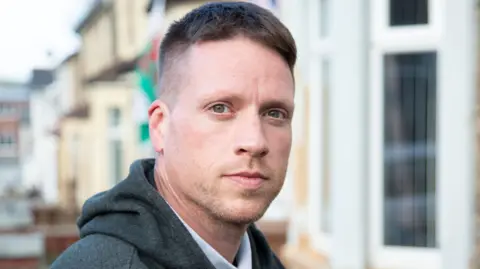 BBC
BBCEvery morning Jon Leeder wakes up, has some breakfast, then takes cannabis before heading to his office job.
The 41-year-old, from Caerphilly in south Wales, uses medical cannabis to help with his anxiety, but until agreeing to speak to the BBC, nobody Jon worked with realised he took it.
“I was a little bit nervous… Are they going to start thinking you come to work stoned?” said Jon, one of an estimated tens of thousands of people in the UK with private cannabis prescriptions.
The NHS has said the risks of medical cannabis are unclear, while one leading psychiatrist warned it could be harming some patients.
“Private clinics are prescribing high potency cannabis for people with psychiatric disorders such as depression and PTSD,” Prof Sir Robin Murray, former president of European Psychiatric Association, told the BBC.
“[There’s] a lot of evidence that high potency cannabis makes these conditions worse and indeed suicidal,” he added.
Cannabis can only be prescribed by a specialist consultant with proof that other treatments haven’t worked.
Cannabis “flower” – or buds – have hardly ever been prescribed on the NHS since the law changed to allow it for medicinal reasons in 2018, but there is a growing private industry.
Most patients we spoke to were paying a few hundred pounds per month to get cannabis.
Some patients, like Jon, said that using medical cannabis gave them the benefits they’d hoped to get from medication such as antidepressants.
Getting behind the wheel of a car, through security at an airport, or even into a bar or club are all things patients say they have to think about carefully. And they must remember to always take their prescription to avoid being criminalised.
Some say they still live in fear of being stopped by police, dismissed from their jobs, or even losing access to their children because of what they describe as the stigma attached to cannabis.
One patient told the BBC she had a letter from her neighbour complaining about the smell of cannabis coming from her flat.
“I was scared,” admitted Kat Turner, 26, who puts pillows in front of her door in an attempt to stop the smell spreading.
‘I feared my neighbours would call the police’
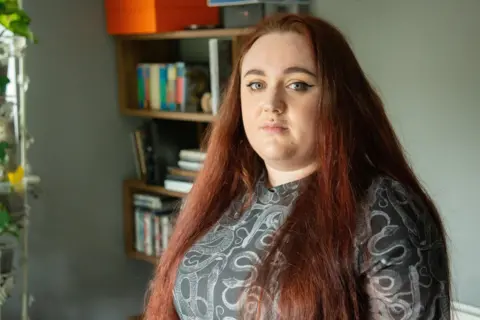
“They could have called the police, that was my fear. I use my front door as little as possible because I’m afraid of any smell going into the communal area.”
Kat takes cannabis after being diagnosed with functional neurological disorder, but the drug can also be prescribed for things like PTSD, OCD, anxiety and depression.
Jon admitted he was “nervous” about telling his work he took medicinal cannabis for his anxiety because he thought his bosses might think he’ll be working “doped up”.
“In films and comedy programmes it’s funny to depict people who smoke weed as lazy and clumsy,” said Jon. “But really, that’s not how it is. It just calms me down a little bit.”
Jon works for one of the country’s largest employers and said they’ve been incredibly supportive – but asked him not to name them.
Patients and clinics that prescribe cannabis say there is little public awareness cannabis can be legal with a prescription, and Jon was worried some people just think of a “lazy stoner” when talking about someone who uses cannabis.
He was first given medical cannabis after a mental health “breakdown” in his late 30s.
“I’ll get big spikes in my anxiety, dwell on random incidents from the past and start panicking about the most random things,” said Jon.
“Weed stops all of that for me.”
Jon, who was recently diagnosed with autism and is awaiting a possible ADHD diagnosis, said he was prescribed “cannabis flower” – the industry term given to cannabis buds.
One condition for Jon being able to access this treatment is that the buds must be vaped, in a special cannabis vaporiser, rather than smoked.
The most recent data suggests there were more than 50,000 private cannabis prescriptions in July 2024 – with figures expected to have grown since then.
It is not just Kat’s neighbours who questioned her cannabis usage, she also was not allowed to take her medicinal cannabis into hospital last year.
She says her functional neurological disorder means she can lose “total control” of her body, suffering intense tics and seizures.
The insurance worker from south Wales was given a three-week in-patient rehabilitation appointment at a specialist NHS unit in Bristol.
But she told us despite informing staff before arrival, when she got to the hospital she was told she would not be allowed her cannabis.
“They implied that my medication could be illegal and that they wouldn’t be able to really allow it inside,” said Kat from Cardiff, who uses both cannabis buds and oil.
“They advised that I would only be able to take the medication if I left hospital grounds.
“My main concern at that point was how I was going to leave the grounds to use my medication, because I have mobility issues and I’m very vulnerable. Especially because of my seizures.
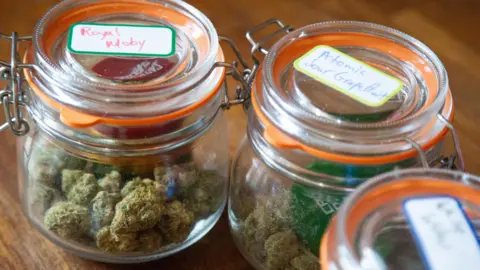
“After a lengthy discussion where I was made to feel like a criminal, I had to make the decision to leave. It felt quite devastating. It felt unfair.”
When she was first diagnosed, Kat was told for the best chance of recovery she would need to start treatment within “three to four weeks”.
However, more than three years later treatment had still not begun – and Kat said she relied on cannabis to help control her tics enough to do things like cut up food and brush her teeth.
“Without being able to take my medication and manage my symptoms, I wouldn’t have been able to benefit from the treatment that they were offering me.”
In a letter, North Bristol NHS Trust apologised for her experience, but said she was the first patient they had experienced who wanted to vape cannabis, and they were updating their policy to reflect what to do when this happens again.
One area where medical cannabis patients said they were seeing more understanding was at gigs and nightclubs.
‘I don’t have the same degree of night terrors I had before’

“I’ve been able to go to festivals and concerts and things like that with my cannabis on me,” said Shash Appan, who spends at least £200 a month on her cannabis prescription for PTSD and fibromyalgia.
The 29-year-old from Cardiff said she often got “funny looks” when heading out into the smoking area on a night out, but when confronted by bouncers had always been able to explain it was medical cannabis without problems.
“One of the main things for me is that I don’t have the same degree of night terrors I had before,” said Shash, who often uses a wheelchair to get around.
“I know for some people the initial effects can be the munchies or laughing, but I’d much rather have that than the depressive, possibly sleepy, side effects of opiates.”
Dr David Howells is one of the few doctors prescribing medical cannabis, and said in the NHS he had often seen the harm cannabis could do to patients with a history of psychosis.
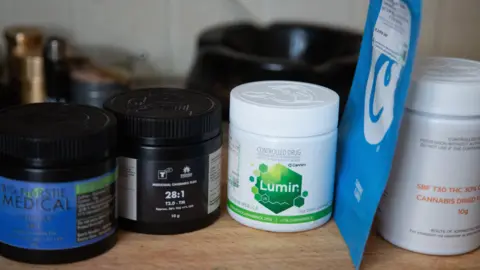
But the former NHS psychiatric consultant believes there is growing evidence to support its use for other conditions when supervised by a specialist doctor.
“The greatest evidence base is for anxiety and pain,” he said.
Dr Howells said his own private patient numbers had grown but many were afraid about how they could be judged for using cannabis.
“Concerns about being stopped [by police] or what they should tell an employer are some of the largest concerns of patients coming to our clinic,” he said.
Dr Howells said clinic staff had needed to intervene on a patient’s behalf with employers, housing associations, family courts and police – describing understanding of the law around medical cannabis as a “postcode lottery”.
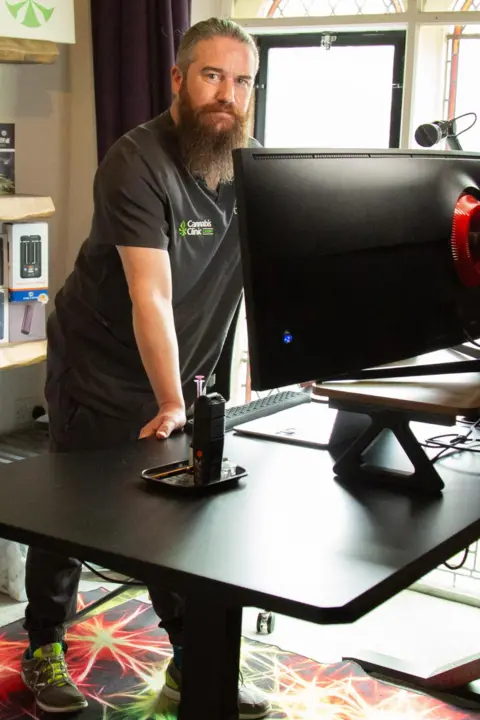
The boss of another clinic had to recently intervene on behalf of other passengers on a UK flight after armed police boarded following reports of a “cannabis smell”.
“They didn’t allow the plane to go before confiscating the medication from the patients and releasing it on the conveyor belt when we got to the destination,” said Jon Robson of online cannabis clinic Mamedica.
“That would be unheard of with any other type of prescribed medication.”
Driving under the influence of cannabis is illegal, but there’s a medical exemption providing patients have followed the dosages prescribed and do not feel impaired.
“We always advise them that they take their medication out within the pots or packages, that would have their name and details on,” said Dr Howells. “That would demonstrate that they are using a legal medical product.”
The Police Chiefs’ Council said new guidance was being drafted to “help to alleviate ambiguity” for police forces around medical cannabis – but reiterated any officer was “within their rights” to stop a driver they suspected of being unsafe.
Both the General Medical Council and Quality Care Commission pointed us to existing guidelines on prescribing when asked to comment.
The NHS has previously said the risks from cannabis products are “not currently clear” and the Advisory Council on the Misuse of Drugs are producing a report for UK Government on cannabis-based products for medicinal use. It is due to be published shortly.
- Details of mental health help and support are available at BBC Action Line
Search
RECENT PRESS RELEASES
Related Post




